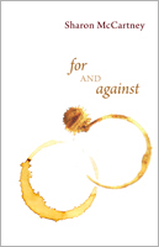 Sharon McCartney Photo by Gabriel Jarman _Sharon McCartney is the author of For and Against (2010, Goose Lane Editions), The Love Song of Laura Ingalls Wilder (2007, Nightwood Editions), Karenin Sings the Blues (2003, Goose Lane Editions), and Under the Abdominal Wall (1999, Anvil Press). In 2008, she received the Acorn/Plantos People's Prize for poetry for The Love Song of Laura Ingalls Wilder. Poems from her current manuscript, Gravitas, were longlisted for the 2010 CBC Literary Awards. She lives in Fredericton, New Brunswick. RUSTY TALK WITH SHARON MCCARTNEY Kathryn Mockler: What is your first memory of writing creatively? Sharon McCartney: My first memory of writing creatively goes back to grade 6 at May Scott Marcy Elementary School in San Diego. We were doing a poetry project, a collection of poems for the class. I was a “horse girl” and I wrote a poem about a horse. The teacher, Mrs. Tatus, asked me to help some of the other kids who were having trouble with the assignment. I was shy, quiet, awkward, full of self-doubt and a little lonely. Writing seemed like something that I could do and perhaps do well and also something that gave me a way to connect with other people. I'm still shy, quiet, awkward, full of self-doubt, and a little lonely and writing is still a way to manage that. KM: What keeps you going as a poet? Or why do you write? SM: I think that I write mostly to figure out how I feel about what's going on in my life. I enjoy writing the most when I discover something new about myself through it. For example, in an early poem about my first night with the man who became my husband, which was basically a “one night stand,” I discovered that I felt committed to him (and loved him) even then. That kind of unearthing happens with poems occasionally. It's a way not of solving problems, most of which are unsolveable anyway, but of finding clarity. A way of ordering thoughts and focusing the brain chatter that goes on all the time. But I also write because it's fun! I hate it when it's not going well and sometimes wish that I enjoyed anything else (like plumbing, perhaps?), but when it works and I end up with a piece that seems complete and alive, nothing feels better. KM: What is the revision process like for you? SM: I find it impossible to separate “writing” from “revision.” To me, they are the same thing. I start out in long hand in a simple spiral notebook. Usually, I'm reading and writing at the same time. I scrawl out bits and pieces and gradually put them together. Right now, I have drafts of 14 poems on the go in my notebook. I'll go back and look over them and make changes here and there. I wait as long as I can before actually typing them up and printing them out because that really changes the process. They're more fluid and malleable for me when they're in script in my notebook. Once they're typed up, I spend more time on each individual word. I have a lot of fun with that stage of the writing process, but it's more like tinkering than the initial writing/revising phase. And if I move to the tinkering phase too early, it's death to the poem. KM: How did you deal with rejection when you first started out? SM: I learned early on to look forward to the rejection slip because it meant that you could send that work somewhere else. Of course, an acceptance is way more fun, but rejection, particularly in the early stages, is unavoidable and necessary. Rejection slips, like bruises and scars, are badges of honour. At first, I collected the rejection slips in an envelope and, when I started teaching, would simply pass the envelope (which got quite heavy) around to the students, who would always laugh when they felt the heft. My favourite rejection slip was from Michael Cuddihy at Ironwood (an American mag). It was simply a tiny one-inch square piece of loose leaf with the word “no” written on it. Imagine him sitting at a desk writing out the word “no” over and over on loose leaf and then cutting up the little rejections slips and dropping them into envelopes. I love it! (and I still have it). But the most important thing about rejection slips is to never take them personally. It's like reviews—there are good ones and bad ones and, in a good world, you can learn from both. KM: How would you describe the writer/editor relationship? SM: I am very very grateful to have editors! A good editor is your best protection against making a complete fool of yourself (at least in writing). Marlene Cookshaw at the Malahat Review caught some very egregious mistakes of mine. A damned fine editor! John Barton, Brian Kaufman, Ross Leckie, and Shane Neilson have all also challenged me creatively and intellectually in their editorial comments on my work. What a luxury to have smart people take the time to read and comment on your work. Sometimes, I have disagreed with editors, but a good writer/editor relationship is one where the two of you can agree to disagree. Ross and I definitely have that kind of a relationship (god love him). Sometimes it's more like we agree to not strangle each other! KM: What are you working on now? SM: My new manuscript is called “Gravitas.” I've got 26 semi-completed poems and, as I said, another 14 in the works in my notebook, but I think that it will be a few years, if ever, before this thing emerges. Many of the poems have to do with bodybuilding, weightlifting, that kind of stuff, which I've been doing for a few years. I love the metaphoric opportunities of the gym. How we get stronger through challenges—big muscles are scar tissue after all. But, in the last few weeks, I've switched to a Crossfit program that's quite different from bodybuilding. There's still lots of weightlifting (squats, deadlifts, presses, etc.), but it's a more whole body kind of approach rather than the isolation exercises that you do in bodybuilding. I'm unsure how that is going to affect my writing, but my god it has affected my body (sore all over). Also, with this manuscript, I'm trying to stay away from dramatic monologues, a form that has become a crutch for me, and from poems about romantic relationships, which can get tiresome for the reader. But, inevitably, that stuff creeps into the poems. I can't help it.  SHARON MCCARTNEY'S MOST RECENT POETRY BOOK For and Against, Goose Lane Editions, 2010 Description from Goose Lane Editions: Heart-corroding sex with a tin woodman. The encapsulation of a foundering marriage in the state of a cat on the brink of death, whose health cannot be restored, but still manages to purr. Sharon McCartney’s visceral exploration of relationships — how they begin and end, the tenuous threads that hold people together, and the events that can tear them apart is unstintingly, eyes-wide-open aware. Beginnings, endings, transitions — none elude the sometimes sardonic but always sensitive, sinuous, and frank language of McCartney’s finely wrought poems. Shedding wilful blindness in favour of life-affirming humour, McCartney pushes language from absolute rawness to moments of intimate retrospection, revealing a delicate tension between anger and calm, past and present, denial and acceptance. Reviews "You don't read these poems, you feel them: Hammer in the head, shod foot on the throat, stiletto in the heart. It's those combos of wild, piercing insights (or unusual but poignant images); yep, that's what makes it good for you - or kills you, laughing." George Elliott Clarke, author of I & I "Darkly obsessive, For and Against documents the rolling flux of life - the raw wounds of relationships in moments that are, in turn, anguished, edgy, droll, and affectionate. McCartney's poems are an extreme sport - one well worth playing." Jeanette Lynes, author of The New Blue Distance "McCartney is tough. She doesn’t feel the obligation to rise above a heart-wrenching experience, to find a bright side, or to soften her bitterness . . . These are poems for feeling bad and liking it; not for regretting the vile things you’ve said and done, but for regretting that you now, alas, know better than to say or do them." Abby Paige, The Rover "McCartney has shown a delightful felicity in previous books with stapling phrases into the memory. For and Against expands this strength with different material, and it’s a testament to her talent that rawness isn’t diminished by an attention to fluency." Brian Palmu |
Rusty Talk
Rusty Talk Editor: Archives
November 2017
Categories
All
|

 RSS Feed
RSS Feed
